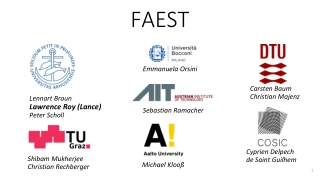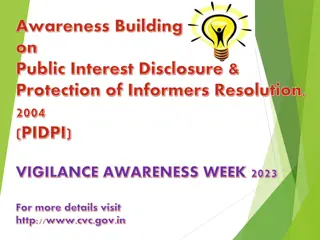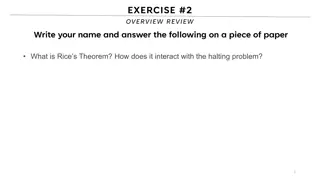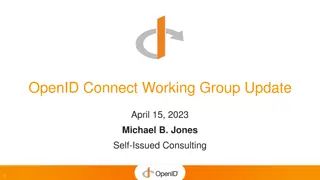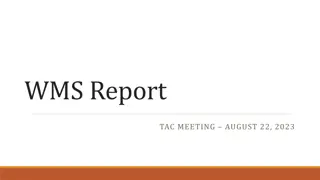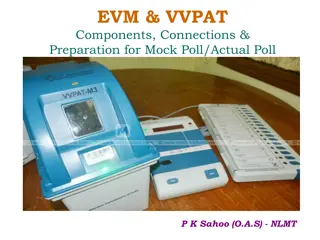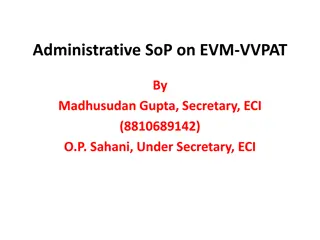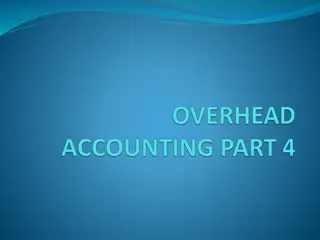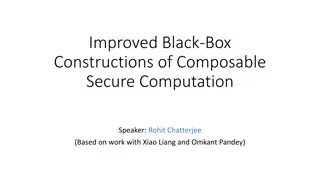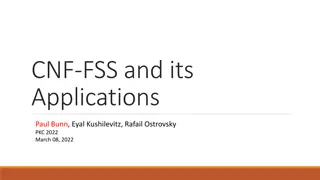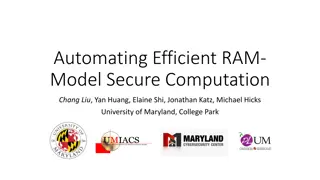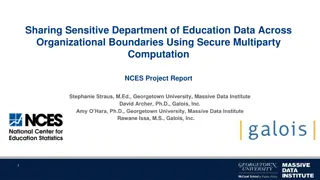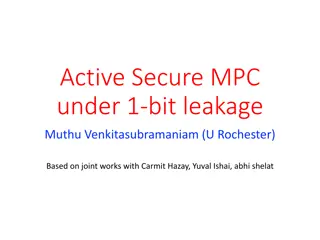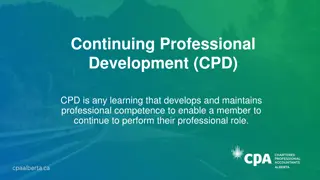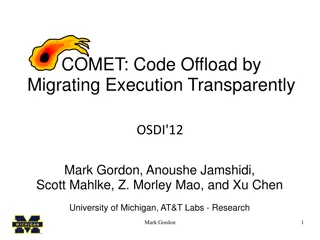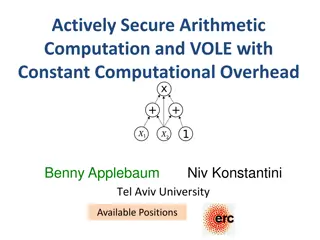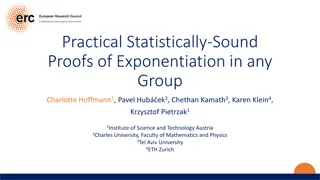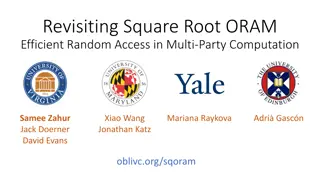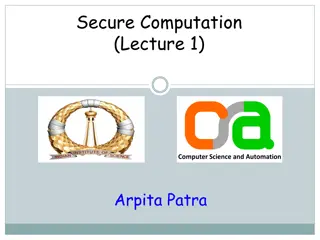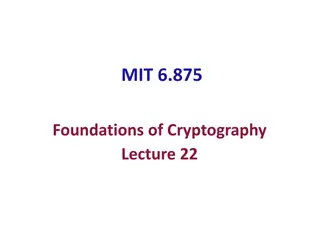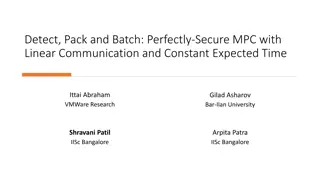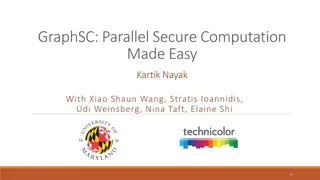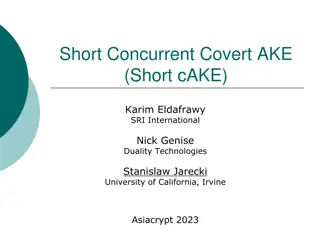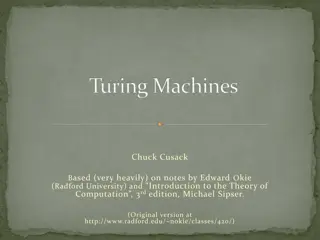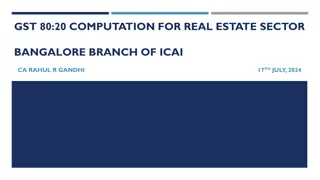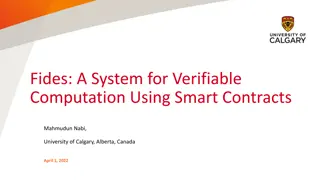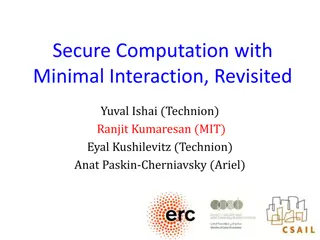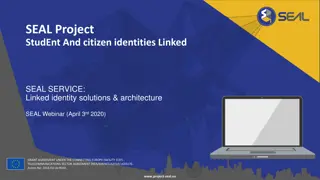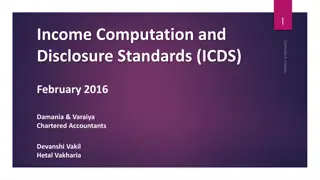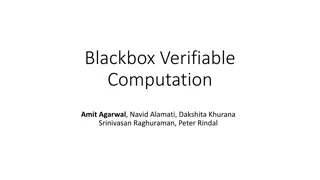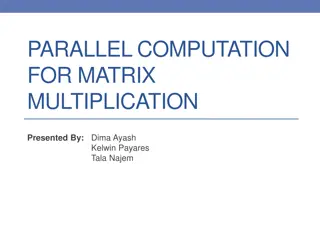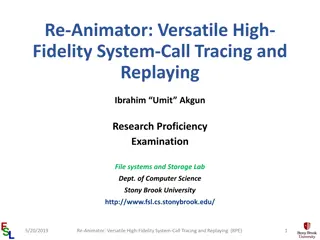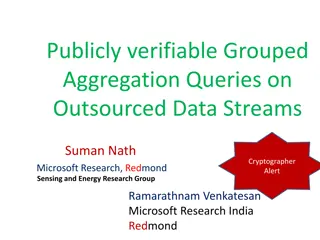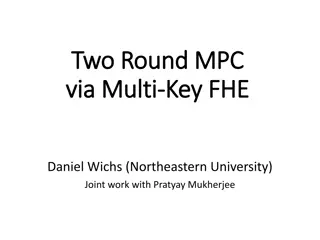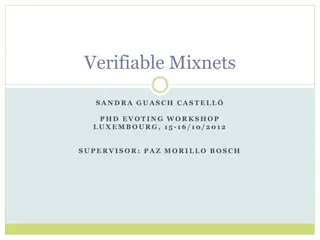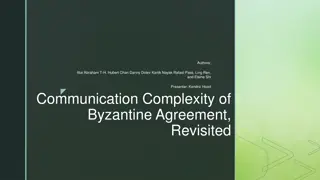Exploring FAEST: Post-Quantum Signatures and Zero-Knowledge Proofs
Delve into the world of FAEST, a post-quantum signature scheme, with a focus on publicly verifiable zero-knowledge proofs. The presentation covers VOLE-in-the-Head, families of ZK proofs, and the application of VOLE in creating VOLE-ZK proofs. Learn about the background of VOLE, its use in the desig
1 views • 26 slides
Public Interest Disclosure & Protection of Informers Resolution - Guidelines for PIDPI Complaints
Guidelines for lodging complaints under the PIDPI resolution to report allegations of corruption or misuse of office by employees in various sectors. Complaints must be specific, verifiable, and sent via post with vigilance angle, ensuring confidentiality of the complainant's identity.
1 views • 10 slides
Computability: Exploring Theoretical Limits of Computation
Delve into computability theory, focusing on what is computable and the limits of computation. Explore concepts like Rice's Theorem, the Halting Problem, and classes of expressiveness in computability theory, such as combinational logic, finite-state machines, pushdown automata, and Turing machines.
5 views • 43 slides
Overview of Distributed Systems: Characteristics, Classification, Computation, Communication, and Fault Models
Characterizing Distributed Systems: Multiple autonomous computers with CPUs, memory, storage, and I/O paths, interconnected geographically, shared state, global invariants. Classifying Distributed Systems: Based on synchrony, communication medium, fault models like crash and Byzantine failures. Comp
9 views • 126 slides
Understanding Post-Election Risk-Limiting Audits in Indiana
Indiana's post-election audits, overseen by the Voting System Technical Oversight Program, utilize statistical methods to verify election outcomes, ensuring accuracy and reliability in the electoral process. The VSTOP team, led by experts in various fields, conducts audits based on Indiana Code IC 3
0 views • 12 slides
OpenID Connect Working Group Update & Progress Report
The OpenID Connect Working Group is actively developing specifications and initiatives to enhance login and identity assurance protocols. From creating the OpenID Connect protocol to incubating OpenID for Verifiable Credentials, the group is laying the foundation for secure authentication and trust
1 views • 8 slides
ERCOT Updates and Revision Requests Overview
In this report, updates and highlights from recent ERCOT meetings and workshops are presented. It covers topics such as settlement stability reports, unregistered DG reports, upcoming WMS meetings, and revision requests tabled for review. The content delves into deep dive reviews of ECRS deployment,
1 views • 9 slides
Guide to EVM and VVPAT Components, Connections, and Preparation for Poll
This comprehensive guide covers the components of Electronic Voting Machines (EVM) and Voter Verifiable Paper Audit Trail (VVPAT) systems, including protocols for setting up, connection processes for mock and actual polls, and instructions for masking/unmasking ballot buttons on the Balloting Unit (
0 views • 13 slides
EVM-VVPAT Administrative Procedures for Election Management
This document outlines the standard operating procedures (SoP) for Electronic Voting Machines (EVMs) and Voter Verifiable Paper Audit Trail (VVPAT) systems used in elections. It covers the components of EVMs, the process of voting, the roles of polling officers, and various sub-topics such as storag
1 views • 58 slides
Computation of Machine Hour Rate: Understanding MHR and Overhead Rates
Computation of Machine Hour Rate (MHR) involves determining the overhead cost of running a machine for one hour. The process includes dividing overheads into fixed and variable categories, calculating fixed overhead hourly rates, computing variable overhead rates, and summing up both for the final M
4 views • 18 slides
Enhanced Security in Multiparty Computation
Explore the improved black-box constructions of composable secure computation, focusing on definitions, objectives, and the formalization basics of multiparty computation (MPC). Learn about the motivating security aspects in MPC and the real/ideal paradigm. Discover how MPC security involves compari
1 views • 68 slides
CNF-FSS and Its Applications: PKC 2022 March 08
Explore the Background, Applications, and Summary of CNF-FSS, focusing on Function Secret Sharing, Distributed Point Function, CNF Key-Sharing, and more. Learn about the efficiency of multiparty sharing and 1-out-of-3 CNF-FSS constructions for certain classes of functions. Discover how CNF Key-Shari
1 views • 33 slides
Secure Computation Techniques in RAM Models with Efficient Automation
Explore the automation of efficient RAM-model secure computation techniques, including examples such as secure binary search. Discover how traditional solutions using circuit abstractions can be improved for sub-linear time computation through methods like Oblivious RAM. Learn about techniques such
0 views • 37 slides
Secure Multiparty Computation for Department of Education Data Sharing
This report discusses the use of Secure Multiparty Computation (SMC) to enable sharing of sensitive Department of Education data across organizational boundaries. The application of SMC allows for joint computation while keeping individual data encrypted, ensuring privacy and security within the Nat
0 views • 15 slides
Advancements in Active Secure Multiparty Computation (MPC)
Delve into the realm of secure multiparty computation under 1-bit leakage, exploring the intersection of DP algorithms, MPC, and the utilization of leakage for enhanced performance. Discover the overhead implications of achieving active security, as well as the evolution of secure computation protoc
0 views • 43 slides
Understanding Continuing Professional Development (CPD) for Professional Growth
Continuing Professional Development (CPD) is crucial for maintaining and enhancing professional competence. Verifiable CPD involves activities with tangible evidence, while unverifiable CPD lacks such evidence. Documentation is key to supporting CPD activities, and examples of verifiable and unverif
0 views • 7 slides
COMET: Code Offload by Migrating Execution - OSDI'12 Summary
The research paper discusses COMET, a system for transparently offloading computation from mobile devices to network resources to improve performance. It outlines the goals of COMET, its design, and evaluation, focusing on distributed shared memory and bridging computation disparity through offloadi
0 views • 31 slides
Actively Secure Arithmetic Computation and VOLE Study
Exploring actively secure arithmetic computation and VOLE with constant computational overhead at Tel Aviv University. Understanding how functions are represented in secure computation using arithmetic circuits over boolean circuits. Efficiently evaluating arithmetic circuits over large finite field
0 views • 36 slides
Practical Statistically-Sound Proofs of Exponentiation in Any Group
The paper presents practical and statistically sound proofs of exponentiation in any group. It discusses the computation process, applications in verifiable delay functions and time-efficient arguments for NP, as well as interactive protocols and the overview of PoEs. The research contributes a stat
0 views • 18 slides
Enhancing Multi-Party Computation Efficiency Through ORAM Techniques
Explore the realm of efficient random access in multi-party computation through the reevaluation of classic schemes and the introduction of new approaches. Discover the potential of ORAM in improving performance and reducing costs in various computational tasks, such as secure multi-party computatio
0 views • 22 slides
Exploring Secure Computation in the Age of Information
Welcome to Secure Computation Lecture 1 by Arpita Patra. The course covers evaluation policies, projects, and references in the realm of secure computation. The content delves into the significance of information security across various sectors, emphasizing the importance of safeguarding sensitive d
0 views • 36 slides
Secure Two-Party Computation and Basic Secret-Sharing Concepts
In today's lecture of "Foundations of Cryptography," the focus is on secure two-party and multi-party computation, emphasizing semi-honest security where Alice and Bob must compute without revealing more than necessary. Concepts such as real-world vs. ideal-world scenarios, the existence of PPT simu
0 views • 27 slides
Linear Communication in Secure Multiparty Computation for Efficient and Fast Processing
The research focuses on achieving perfectly secure multiparty computation (MPC) with linear communication and constant expected time. It explores efficient approaches using a broadcast-hybrid model and P2P communication, aiming to balance speed and efficiency in MPC. The study highlights the importa
0 views • 23 slides
Secure Computation Challenges and Solutions in Data Mining
Exploring the intersection of secure computation and data mining, this content uncovers key challenges such as improving algorithms, converting programs for secure computation, and addressing parallelizability issues. It highlights the importance of cryptography in ensuring data privacy and presents
0 views • 30 slides
The Logical Structure of Classical and Quantum Mechanics
The paper explores the common logical structure shared between classical and quantum mechanics, emphasizing the non-distributive lattice embedded in a distributive one. It discusses how all physical theories must adhere to this structure, incorporating topology, Heyting algebra, Boolean algebra, and
1 views • 36 slides
Covert Computation: Ensuring Undetectable Engagement
Covert computation aims to conceal the fact that computation is occurring and hide engagement in certain tasks like secure computation, authenticated key exchange, and more. By making messages indistinguishable and utilizing steganographic channels, it becomes possible to keep the activities covert
0 views • 16 slides
Overview of Turing Machines: Introduction, Tape, and Computation
Turing Machines are fundamental in the theory of computation, capable of recognizing all computable languages. They consist of a Finite State Machine combined with an infinite tape. The tape is initialized with input on the left end, and a TM's computation can either halt by entering special accept
0 views • 29 slides
Computation for Real Estate Sector in Bangalore Branch of ICAI
Practical overview of GST computation for real estate transactions in Bangalore, with details on old rates with ITC and new rate regime effective from April 1, 2019. The content discusses different transactions, conditions for new rates without ITC, and provides insights on the 80:20 computation met
0 views • 39 slides
Fides: A System for Verifiable Computation Using Smart Contracts
Fides presents a system for verifiable computation using smart contracts, focusing on blockchain basics, Ethereum, smart contracts, and outsourcing computation. It explores key components of blockchain, Ethereum's decentralized computing platform, properties of smart contracts, and the concept of ve
0 views • 25 slides
Insights into Secure Computation with Minimal Interaction
This paper revisits the concept of secure computation with minimal interaction, focusing on the challenges and possibilities of achieving secure multiparty computation in 2 rounds. Specifically exploring scenarios with 3 and 4 parties, the study delves into the reasons for choosing n=3, n=4, and t=1
0 views • 23 slides
SEAL Project: Enhancing Identity Management and KYC Solutions
The SEAL project aims to provide a robust infrastructure for identity management and KYC processes, emphasizing user data control and decentralized storage to minimize risks. Using a combination of federated and self-sovereign approach, SEAL offers microservice-based architecture supporting web and
0 views • 12 slides
Overview of Income Computation and Disclosure Standards (ICDS)
The Income-tax Act, 1961 introduced Income Computation and Disclosure Standards (ICDS) to be followed by certain assesses for computation of income. ICDS applies to taxpayers using the mercantile system of accounting from the Assessment Year 2016-17 onwards. Non-compliance with ICDS can lead to Best
0 views • 49 slides
Blackbox Verifiable Computation Scheme Overview
This summarized content discusses the concept of blackbox verifiable computation, focusing on the challenges faced by clients and servers, the role of helper oracles, positive results utilizing homomorphic encryption, and background information on Random Self Reducible (RSR) functions. The protocol
0 views • 20 slides
Parallel Computation for Matrix Multiplication
Matrix multiplication is a fundamental operation with diverse applications across scientific research. Parallel computation for matrix multiplication involves distributing the computational workload over multiple processors, improving efficiency. Different algorithms have been developed for multiply
0 views • 36 slides
Re-Animator: Versatile System Call Tracing and Replaying
Re-Animator is a research project focusing on creating a high-fidelity system call capturing system with minimized overheads. The project aims to capture long-running applications and provide scalable and verifiable system call replaying. It introduces two prototype system call tracing systems and h
0 views • 39 slides
Importance of Requirements Management in Project Success
Requirements management is crucial for project success, involving careful consideration of various requirement types such as functional, performance, constraints, and more. Clear, consistent, and verifiable requirements are essential, along with understanding the origins, impacts, and alternatives f
0 views • 13 slides
Publicly Verifiable Grouped Aggregation Queries on Outsourced Data Streams
Explore the challenges and solutions for publicly verifiable grouped aggregation queries on outsourced data streams, focusing on security, verification, and cloud computing. The research discusses how to handle large amounts of data using small memory components and emphasizes the importance of data
0 views • 34 slides
Advanced Techniques in Multi-Party Computation
Explore cutting-edge methods in Multi-Party Computation (MPC), including leveraging Fully Homomorphic Encryption (FHE) for minimal round complexity, constructing MPC directly via FHE techniques, and simplifying multi-key FHE constructions for efficient decryption. Learn about key concepts such as di
0 views • 17 slides
Understanding Verifiable Mixnets in Electronic Voting Systems
Explore the concept of verifiable mixnets in electronic voting systems through topics like counting methods, preserving vote secrecy, and verifiability of the counting process. Learn about Verificatum, commitment schemes, and proof techniques for ensuring mixing correctness in voting processes.
0 views • 22 slides
Communication Complexity in Byzantine Agreement Research
The presentation discusses communication complexity in Byzantine Agreement, emphasizing a lower bound of (f/2) when After the Fact removal is considered. It explores two major contributions - the communication lower bound in randomized protocols and near-optimal subquadratic Byzantine Agreement. The
0 views • 9 slides
